![]()
![]()
![]()
Use LEFT and RIGHT arrow keys to navigate between flashcards;
Use UP and DOWN arrow keys to flip the card;
H to show hint;
A reads text to speech;
20 Cards in this Set
- Front
- Back
|
divine right |
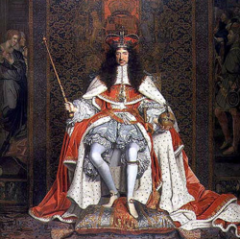
The doctrine that kings and queens have a God-given right to rule and that rebellion against them is a sin. |
|
|
absolute monarch |
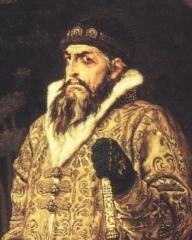
A monarchical form of government in which the monarch has absolute power among his or her people. They wield unrestricted political power over the sovereign state and its people. |
|
|
Phillip 2 |
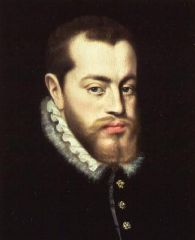
A king, also known as Philip the Prudent, ruled one of the world's largest empires. His reign as Spain's king began the Golden Age, a period of great cultural growth in literature, music and the visual arts. He was also the King of England through his marriage to Mary Tudor for four years. |
|
|
Louis XIV |

He became king in 1643. Then later, he started reforming France. In 1667 he invaded the Spanish Netherlands. From 1672–1678 he engaged France in the Franco-Dutch War. In 1688, he led a war between France and the Grand Alliance. By the 1680s, Louis XIV generated public hostility. |
|
|
Edict of Nantes |
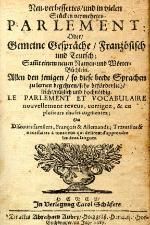
Signed probably on 30 April 1598, by King Henry IV of France, granted the Calvinist Protestants of France (also known as Huguenots) substantial rights in the nation, which was, at the time, still considered essentially Catholic. |
|
|
War of the Spanish Succession |
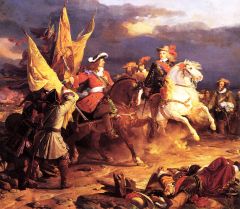
The first world war of modern times with theatres of war in Spain, Italy, Germany, Holland, and at sea. |
|
|
30 Years' War |
Began when Holy Roman Emperor Ferdinand II of Bohemia attempted to curtail the religious activities of his subjects, sparking rebellion among Protestants. The war came to involve the major powers of Europe, with Sweden, France, Spain and Austria all waging campaigns primarily on German soil. Known in part for the atrocities committed by mercenary soldiers, the war ended with a series of treaties that made up the Peace of Westphalia. The fallout reshaped the religious and political map of central Europe, setting the stage for the old centralized Roman Catholic empire to give way to a community of sovereign states. |
|
|
Maria Theresa |
Archduchess of Austria, queen of Hungary and Bohemia 1740–80. The daughter of the Emperor Charles VI, she succeeded to the Habsburg dominions in 1740 by virtue of the Pragmatic Sanction. |
|
|
Fredrick the Great |
King of Prussia from 1740 to 1786; brought Prussia military prestige by winning the War of the Austrian Succession and the Seven Years' War (1712-1786) |
|
|
Seven Years' War |
A war fought in the middle of the eighteenth century between the German kingdom of Prussia, supported by Britain, and an alliance that included Austria, France, and Russia. Prussia and Britain won, and their victory greatly increased their power. |
|
|
Ivan the Terrible |
He was the Grand Prince of Moscow from 1533 to 1547 and 'Tsar of All the Russias' from 1547 until his death in 1584. He also confirmed power of tsarist autocracy by attacking authority of boyars (aristocrats);continued policy of Russian expansion;established contacts with western Europe commerce and trade |
|
|
Boyars |
Members of the old aristocracy in Russia, next in rank to a prince. |
|
|
Peter the Great |
A Russian czar of the late seventeenth and early eighteenth centuries who tried to transform Russia from a backward nation into a progressive one by introducing customs and ideas from western European countries. |
|
|
Westernization |
A process whereby societies come under or adopt Western culture in areas such as industry, technology, law, politics, economics, lifestyle,diet, clothing, language, alphabet, religion, philosophy, and values. |
|
|
Charles 1 |
King of England, Scotland, and Ireland (1625-1649). His power struggles with Parliament resulted in the English Civil War (1642-1648) in which he was defeated. He was tried for treason and beheaded in 1649. |
|
|
English Civil War |
A series of armed conflicts and political machinations between Parliamentarians ("Roundheads") and Royalists ("Cavaliers") over, principally, the manner of its government. |
|
|
Oliver Cromwell |
An English military and political leader and later Lord Protector of the Commonwealth of England, Scotland and Ireland. |
|
|
Glorious Revolution |
Also called the Revolution of 1688, it was the overthrow of King James II of England (James VII of Scotland and James II of Ireland) by a union of English Parliamentarians with the Dutch stadtholder William III of Orange-Nassau (William of Orange). |
|
|
Constitutional Monarchy |
A form of national government in which the power of the monarch (the king or queen) is restrained by a parliament, by law, or by custom. |
|
|
habaes corpus |
A writ requiring a person under arrest to be brought before a judge or into court, especially to secure the person's release unless lawful grounds are shown for their detention. |

